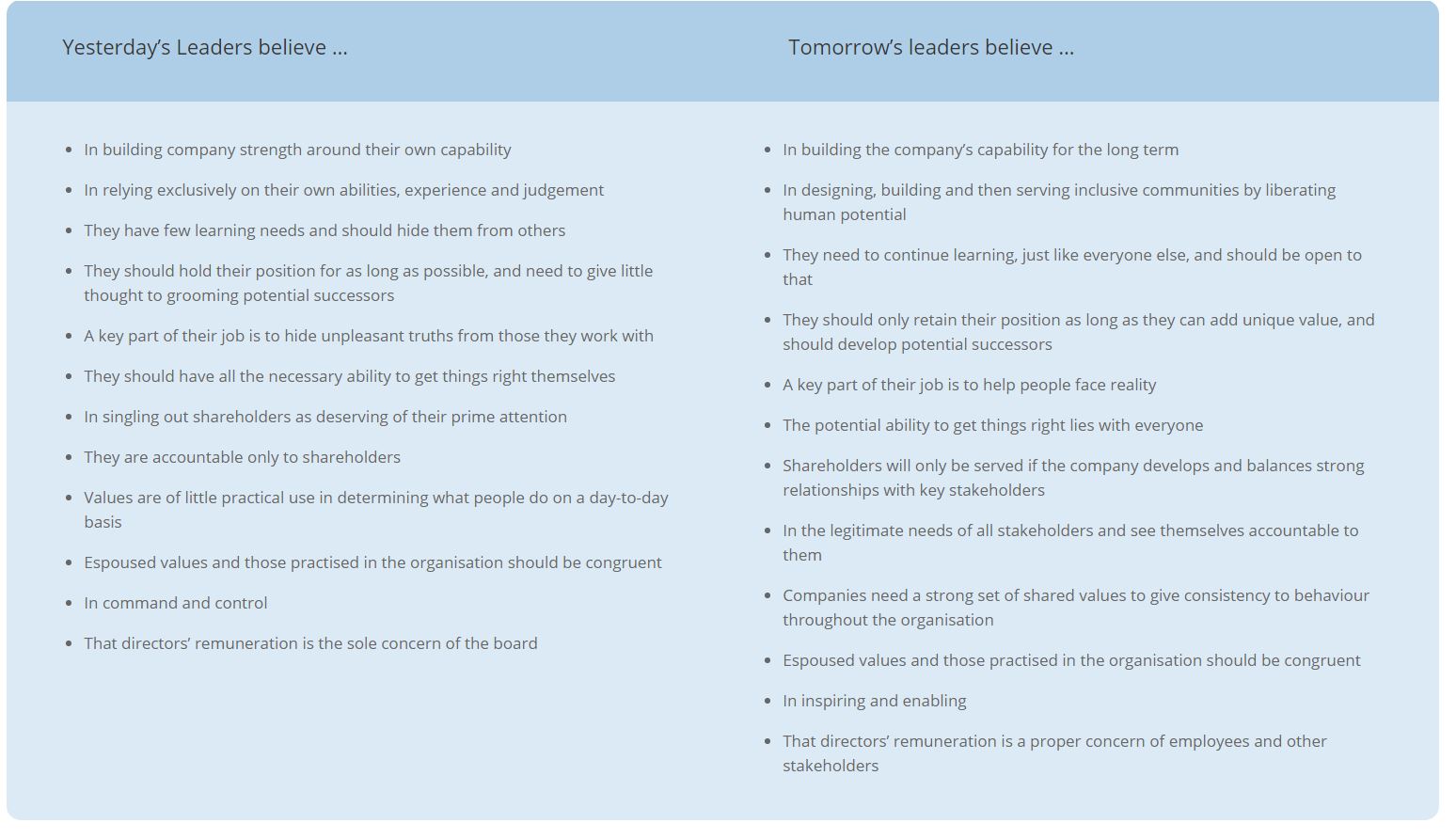
Building Inclusive Relationships in Tomorrow’s Company
In 1995 the RSA (Royal Society for the encouragement of Arts, Manufactures and Commerce) published the findings of its Inquiry by a group of British business leaders into Tomorrow’s Company – The Role of Business in a Changing World. The Inquiry, chaired by Sir Anthony Cleaver, was triggered by an urgent need to improve the sustainable competitive performance of UK companies. Its conclusion was that there was no simple technical formula for success. Instead, what each company needed was an inclusive relationship with customers, employees, suppliers, investors and the wider community.
The Centre for Tomorrow’s Company (later simply called Tomorrow’s Company) was set up in 1996 to inspire and enable companies to implement that agenda. Its director is Mark Goyder, the programme director of the RSA Inquiry. Bill worked closely with Mark and the Centre, supporting its research programme. He researched and wrote the materials that accompany the eight-part BBC video series Building Tomorrow’s Company. These contain an audit tool to serve as a trigger from which a company’s development action may spring. Contact Bill for further information. (Also see the Resources< Centre for more information.)
Here is a short extract from the Introduction to the series:
‘What should a ‘tomorrow’s company’ be like?’
This question lies at the heart of a critical debate about what will make companies successful and relevant in a future that is fast changing and ever more demanding. The discussion is fundamental to the world of business and all those impacted by it. This includes a company’s customers, employees, suppliers, investors, and its local community – that is, all its ‘stakeholders’. The question matters for wider society too, for public policy makers, the City, lobby groups, educators and business school students, who are tomorrow’s wealth creators.
Success for businesses, as for individuals, will be summed up in the paradox of permanence… Companies will have earned their lasting place in a dizzy, complex, and critical world because, somewhere deep down, people feel they have integrity. Products will be changing far too quickly for businesses to be differentiated on the quality of products alone. Businesses will stand out from the pack because, in all the relationships which are crucial to their success, people know what they stand for and can identify with them. (Mark Goyder (1988): Living Tomorrow’s Company
Yet there is no single answer to the question of what characterises tomorrow’s successful company. Entrepreneurs, boards and leaders need to work out their own answers to some fundamental questions.
- What does the company really stand for?
- Where does the company’s success come from?
- Which are the relationships that can make or break the business?
- How can the company measure how successful it is with key relationships: customers, employees, investors, suppliers and communities?
- To whom is the board responsible – shareholders, the company or other stakeholders?
- How does the company communicate about its social impact as well as its financial performance?
Leadership in Tomorrow’s Company
The first video in the eight-part BBC for Business series is on the subject of Leadership in Tomorrow’s Company. This chart developed by Bill sets out the contrasting beliefs that characterise leadership in yesterday’s and tomorrow’s company.
Yesterday’s Leaders believe …
Tomorrow’s leaders believe …
- In building company strength around their own capability
- In relying exclusively on their own abilities, experience and judgement
- They have few learning needs and should hide them from others
- They should hold their position for as long as possible, and need to give little thought to grooming potential successors
- A key part of their job is to hide unpleasant truths from those they work with
- They should have all the necessary ability to get things right themselves
- In singling out shareholders as deserving of their prime attention
- They are accountable only to shareholders
- Values are of little practical use in determining what people do on a day-to-day basis
- Espoused values and those practised in the organisation should be congruent
- In command and control
- That directors’ remuneration is the sole concern of the board
- In building the company’s capability for the long term
- In designing, building and then serving inclusive communities by liberating human potential
- They need to continue learning, just like everyone else, and should be open to that
- They should only retain their position as long as they can add unique value, and should develop potential successors
- A key part of their job is to help people face reality
- The potential ability to get things right lies with everyone
- Shareholders will only be served if the company develops and balances strong relationships with key stakeholders
- In the legitimate needs of all stakeholders and see themselves accountable to them
- Companies need a strong set of shared values to give consistency to behaviour throughout the organisation
- Espoused values and those practised in the organisation should be congruent
- In inspiring and enabling
- That directors’ remuneration is a proper concern of employees and other stakeholders

For further information about the BBC video series Building Tomorrow’s Company click here
